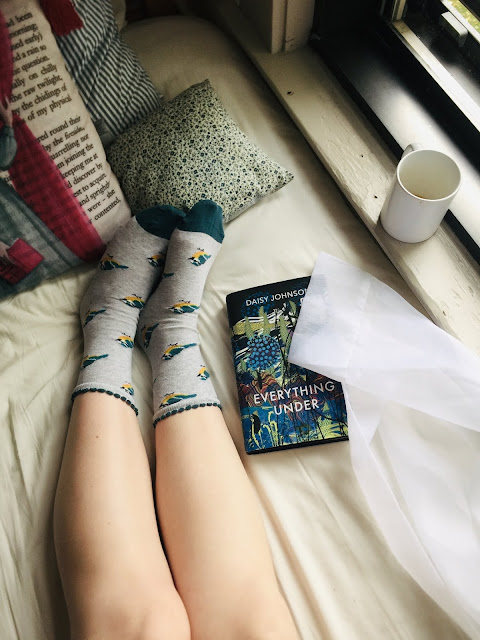Two Janes: David Harbour, the Duffer Brothers, and Reimagining Charlotte Brontë's Classic
Last evening, David Harbour won Best Supporting Actor in a Drama Series at the Critics’ Choice Awards for his role of Jim Hopper in Stranger Things. Unlike his peers, who used their acceptance speeches to thank their communities, Harbour provided a summary of his character’s journey in the second season of the sci-fi drama.
“Hopper spends the majority of the fall of '84 holed up in a cabin with a maturing young woman, desperately, stumblingly trying to care for her as her ever-adapting, evolving needs slip through his unsophisticated fingers, his rigid beliefs, his fear that the world isn't ready,” Harbour read from a carefully-drafted piece of paper. “The world isn’t ready for the secret, inherent power she has inside her. She is feral. He, her guardian. The cabin is safe, comforting, and it’s dangerous out there. And yet, she leaves, and when reconnected with her sister, she is lit aflame, and she carries this fire, this light, back to Hawkins.”
Harbour’s underlying message, particularly in the light of the Weinstein allegations and the #TimesUp movement, is iridescent. However, when I listened to Harbour’s eloquent speech, I was reminded of another fiery girl named Jane, one I had recognized months ago in the red-washed Hawkins cabin and among the trash-can hearth on Chicago’s South Side.
Whether or not the deep similarities were fully intentional, the Duffer Brothers’ Eleven, portrayed excellently by Millie Bobby Brown, recalls Charlotte Brontë’s Jane Eyre. When examined closely, the parallels extend far beyond their eerily similar birth names (“Jane Eyre” to “Jane Ives”). Eleven’s imprisonment in Hawkins Lab mirrors Jane Eyre’s early years with the abusive Reeds family. Her anger at Hopper, who keeps her locked in a cabin “to keep her safe” recalls Jane’s frustration with Rochester, who attempts to cage her in an illegal marriage. Even Eleven’s mother, who has gone “mad” from male abuse, likens to Brontë’s original madwoman in the attic, Bertha.
Most of all, though, Jane Eyre’s and Eleven’s storylines follow similar migrations. Both women run away to new, imperfect families. With her supernatural powers, Eleven finds her “sister,” Kali, huddled against a fire, echoing Jane’s meeting with the Rivers’ sisters:
From the lozenged panes of a very small latticed window...I could see...a group of more interest appeared near the hearth...two young, graceful women—ladies in every point—sat...they were all delicacy and cultivation...as they each bent over a book, they looked thoughtful almost to severity. (381-2)
Like Diana and Mary, Kali welcomes Jane into sisterhood with her mismatched family of social outcasts. However, it turns out that Kali also encompasses the darker characteristics of the Rivers’ brother, St. John. Though St. John threatens Jane’s spirit with passionless religious revisionism, his radical nature is mirrored in Kali’s unflinching desire to destroy the men who stole her life. Both Janes are alarmed by the realities of their new families, but they only return to their true homes at the call of help. As Brontë’s Jane hears the supernatural cries of Rochester hundreds of miles from home, Eleven sees in her mindseye the troubling images of Hopper and Mike Wheeler, her best friend-turned-crush. Walking away from powerful journeys, Jane and Eleven chose love over their newfound independence. “They can’t save you!” Kali calls to Eleven desperately as she walks away from their getaway car in Chicago. “No,” Eleven replies, “but I can save them.”
Why do the Duffer Brothers choose to adapt Brontë’s novel in their bizarre sci-fi period piece? Perhaps they simply wanted to pay homage to the nineteenth century orphan tradition. However, it is much more likely they tried to reimagine Jane Eyre for a modern audience. By giving their Jane superpowers instead of formless “passion,” the Duffer Brothers overpower the traditional Jane figure, pulling the feminist undertones of Brontë’s work to the forefront of their own story. Though Eleven appears to have more power than Jane, she is actually still constrained by her contemporary socio-political position as a young girl. The Duffer Brothers evoke second-wave feminism, suggesting the opinion that female agency, both in 1980 and today, is much the same as it was in Brontë’s era.
The Duffer Brothers were criticized this season by feminist writers for writing powerful female characters who do not interact with one another. I share these critiques and hope desperately that next season might see Eleven building a friendship with Sadie Sink’s wonderful Max, Natalia Dyer’s Nancy hanging out with the female peers she must have, and Winona Ryder’s Joyce sharing a glass of wine with other mothers of the “Party” members. However, as a lover of literature and a (hopefully) budding Brontë scholar, I have to applaud the Duffer Brothers for their evocative retelling of Jane Eyre. As David Harbour clearly understands when he thanks Ryder, Brown, and his mother in his speech, Stranger Things is, at its core, a story about two passionate women: a mother who wants to protect her son and a little girl looking for her place in the world. Powerful girls, and all who are locked away like them, are “the key to suturing the wound, resurrecting life, cleansing the infection, closing the rift” of society’s deepest problems. Next time, whether it be at an award show or in a television season or in the back of the classroom, let’s see them who they truly are.



Comments
Post a Comment